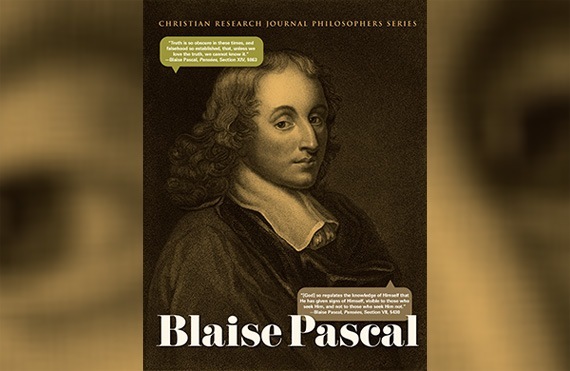This article first appeared in the CHRISTIAN RESEARCH JOURNAL, volume 37, number 03 (2014). Note: This is part of our ongoing Philosophers Series.
Although he lived for only thirty-nine years, French philosopher, mathematician, and scientist Blaise Pascal (1623-1662) left an indelible mark on Christianity. Pascal is well known in scientific circles for, among other things, his studies of the vacuum and his invention of the world’s first automated calculating machine, but Pascal has much more to offer. In his fragmented and often brilliant writings, Pascal offers cogent observations on issues such as human nature, theology, and apologetics. His lucid, yet at times unpolished, insights cut deeply into matters of the human condition and touch on subjects of great significance and relevance to everyday life.1
Pascal intended to write a substantial work of apologetics called An Apology for the Christian Religion, which he never completed. Instead, after his untimely death due to illness, his many thoughts and notes on the project were collected in Pensées (“Thoughts”), a classic work that has been honored with a place in Encyclopedia Britannica’s Great Books of the Western World series and the Harvard Classics collection.2 Os Guinness and Louise Cowan rightly describe Pensées as “a penetrating, original, and stylish defense of the Christian faith and one of the supreme Christian writings of all time…few authors have captured the human predicament so poignantly.” Later they remark that the work “provides an astonishing window into the human heart,”3 adding, “Pensées is a classic to be read and reread, for it is a gold mine of Christian reflections on the human condition.”4
Unfortunately, aside from his famous wager argument, Pascal’s philosophical and apologetic insights are often neglected. This article will provide an overview of key insights Pascal has to offer contemporary Christians, especially in relation to the task of defending the faith.
FAITH AND REASON: HEART AND HEAD
Pascal is sometimes accused of taking a fideistic approach to apologetics, meaning that he supposedly valued faith over reason. Some even claim, falsely, that following his deep conversion to Christ, Pascal abandoned scientific pursuits. At any rate, one of Pascal’s most famous fragments is often cited in support of Pascal’s fideism: “The heart has its reasons of which reason knows nothing: we know this in countless ways.”5 The fragment itself, however, acknowledges that “we know this in countless ways,” suggesting that Pascal’s epistemology (view of knowledge) is more sophisticated than simply categorizing him as a fideist. Elsewhere, for instance, Pascal remarks, “We know the truth not only through our reason but also through our heart.”6 In another fragment we read, “The way of God…is to instill religion into our minds with reasoned arguments, and into our hearts with grace.”7
Granted, scholars are not in complete agreement regarding Pascal’s views of faith and reason. Nevertheless, there is sufficient evidence to argue that Pascal valued reason, as well as certain lines of apologetic reasoning and evidence, such as by appealing to the testimony of miracles (including the resurrection of Christ), the value of predictive prophecy (especially in relation to the Messiah), the Jewish people, the value of the example set by Christianity, and the fact that Christianity best explains the human condition. Philosopher Peter Kreeft says, “Pascal is neither a fideist nor a rationalist,”8 later adding, “Some Christian fideists want to kidnap Pascal and pin their label on him. It cannot be done… Like Augustine, Pascal knows that the heart is deeper than the head, but like Augustine he does not cut off his own head, or so soften it up with relativism and subjectivism and ‘open-mindedness’ that his brains fall out.”9
While it is true that Pascal rejected natural theology arguments, he did not abandon reason in making his defense of Christianity. Rather, he utilized different lines of reasoning beyond traditional natural theology arguments for God.10 For Pascal, the “heart” suggests intuitive belief that can apprehend God in a manner that is different than reason. Thus, philosopher Frederick Copleston calls Pascal’s view of the heart “a kind of intellectual instinct, rooted in the inmost nature of the soul.”11
Pascal, then, valued both faith and reason, emphasizing an intuitive “heart” sense of God, as well as the implementation of various lines of argumentation and reasoning in support of Christianity.12
THE HUMAN CONDITION: GREAT AND WRETCHED
One of Pascal’s key apologetic arguments is rooted in his view of the human condition. A recurring theme in Pensées has to do with the seeming paradox within human beings—that we are both great and wretched:13
Man’s greatness and wretchedness are so evident that the true religion must necessarily teach us that there is in man some great principle of greatness and some great principle of wretchedness.14
Greatness, wretchedness. The more enlightened we are the more greatness and vileness we discover in man.15
What sort of freak then is man! How novel, how monstrous, how chaotic, how paradoxical, how prodigious! Judge of all things, feeble earthworm, repository of truth, sink of doubt and error, glory and refuse of the universe! Who will unravel such a tangle?16
To Pascal, there is a significant seeming paradox within human beings—we have the capacity for greatness, but also inclinations toward wretchedness. In seeking a solution to this riddle or contradiction within human beings, Pascal applies a scientific form of reasoning known as abductive reasoning, which essentially seeks to reason to the best explanation. Given the data, Pascal concludes that Christianity offers the best explanation for human greatness and wretchedness. We are great, says Pascal, because we are made in God’s image. However, we are also wretched because of the fall.
This argument has caused some critics to accuse Pascal of circular reasoning. After all, they say, he is appealing to the Bible to prove the Bible. But this criticism is simplistic. It fails to consider that Pascal is appealing to empirical evidence—namely, he can point to human behavior that offers real examples of both greatness and wretchedness. D. G. Preston comments, “Pascal the empiricist starts with the data, notably the inexplicable phenomenon of mankind: unquestionably corrupt, subject to inconstancy, boredom, anxiety and selfishness, doing anything in the waking hours to divert the mind from human wretchedness, yet showing vestiges of inherent greatness in the mind’s realization of this condition.”17 After making the case for human greatness and wretchedness by appealing to evidence, Pascal then reasons to Christianity as being the best explanation for the human paradox of greatness and wretchedness. In this way, Pascal avoids circular reasoning.
Pascal’s anthropological argument remains relevant. It appeals to prudence and human psychology. We want to know about ourselves and why people behave the way they do. As Thomas Morris puts it, “The human enigma cries out for explanation. Pascal believed that only the tenets of the Christian faith can adequately account for both the greatness and wretchedness of humanity.”18
Integrating Pascal’s anthropological argument into his overall apologetic approach will lead us to Pascal’s emphasis on Christ the redeemer as the ultimate solution to the human predicament.
THE WAGER: GAMBLING ON GOD?
Pascal’s wager is probably his most well-known philosophical argument and also one of his most controversial. Praised as brilliant, dismissed as misguided (or even harshly ridiculed), Pascal’s wager continues to generate both academic and popular debate. In this sense at the very least it remains an engaging argument simply by generating continued interest.
Unfortunately, the wager is often misrepresented and misinterpreted. Some of this confusion is due to the fact that Pascal never fully developed the argument, combined with the fact that it is difficult to place the notes in a sensible order. Despite the fact that it is one of his lengthier fragments, the wager notes are hardly conducive to a simple explanation: “It was written on four sides of a single folded sheet. Some paragraphs are inserted into the main text, other sentences are written vertically up the margins, and parts are written upside down on the page.”19 Not surprisingly, this makes it challenging for scholars and interpreters to even set the order of the fragment in a way that Pascal intended.
One must also keep in mind Pascal’s overall apologetic approach. At what point, for instance, did Pascal intend the wager to arise? It seems unlikely that he intended the wager as a complete, stand-alone argument that could function in isolation from other lines of apologetic reasoning, but this is how some treat the wager. Scholars such as A. J. Krailsheimer have argued that the wager would come later in Pascal’s overall approach, serving as a sort of “hinge” after “the unbeliever is ready to give Christianity a trial.”20
With that said, what is Pascal’s wager? Douglas Groothuis summarizes the wager as follows: “Pascal claims that even though philosophical proof for God is not possible, one should believe in God since, if God exists, one would be far better off believing in him (since this is a necessary condition for heaven) than disbelieving in him (which means the loss of heaven). In light of this, Pascal argues his interlocutor to engage in a devotional experiment that may generate theist belief and salvation.”21
In short, Pascal urges unbelievers to wager on God, as this makes the most prudential sense. “Yes, but you must wager,” writes Pascal. “There is no choice, you are already committed. Which will you choose then? Let us see: since a choice must be made, let us see which offers you the least interest. You have two things to lose: the true and the good; and two things to stake: your reason and your will, your knowledge and your happiness; and your nature has two things to avoid: error and wretchedness.”22
FILLING THE INFINITE ABYSS
Pascal’s insights, particularly those gleaned from his Pensées, are often criticized. In some instances such criticisms are warranted, but in many other instances we must remember that Pensées consists of Pascal’s fragmentary sketches, rough drafts, and unrefined remarks. As such, Pensées should be interpreted in light of the broader overall context of Pascal’s worldview, philosophy, and recurring themes in his body of works. Besides, to be fair, his unrefined scribblings are more often than not of far more worth than the vitriol of his critics.
Although he lived more than three hundred years ago, Pascal’s moving insights continue to touch both heart and head. Many of his apologetic arguments are timeless, capturing the attention of readers via engaging phrases and insights, presenting ageless practical wisdom, and even serving as devotional reading. His keen understandings of human nature are not abstract or academic, but accessible. Because they are about who we are, Pascal’s fragments affect us personally.
Pascal wrote, “What else does this craving, and this helplessness, proclaim but that there was once in man a true happiness, of which all that now remains is empty print and trace? This he tries in vain to fill with everything around him,
seeking in things that are not there the help he cannot find in those that are, though none can help, since this infinite abyss can be filled only with an infinite and immutable object; in other words by God himself.”23 Ultimately, Pascal’s apologetic points us firmly in the direction of God and Christ.
Robert Velarde has authored several books, including A Visual Defense (Kregel Publications, 2013). He received his M.A. from Southern Evangelical Seminary.
NOTES
- For further insights on Pascal, see Making Sense of It All by Thomas V. Morris (Grand Rapids: Eerdmans, 1992); Christianity for Modern Pagans by Peter Kreeft (San Francisco: Ignatius, 1993); On Pascal by Douglas Groothuis (Belmont, CA: Thomson Wadsworth, 2003); and The Mind on Fire edited by James M. Houston (Wheaton, IL: Victor Books, 2006).
- One of the best English translations of Pensées is by A. J. Krailsheimer (New York: Penguin Books, 1966). Oxford World’s Classics published a translation by Honor Levi in 1995, and William Finlayson Trotter’s translation is public domain. All quotations of Pensées in this article refer to the Krailsheimer edition, with the first reference number corresponding to the Lafuma numbering system used by Krailsheimer and others and the second number referring to the Bunschvicg numbering used in some editions of Pensées, such as the Great Books and Harvard Classics.
- Louise Cowan and Os Guinness, Invitation to the Classics (Grand Rapids: Baker Book House, 1998), 169.
- Ibid., 171.
- Pensées, 423, 277.
- Ibid., 110, 282.
- Ibid., 172, 185.
- Kreeft, Christianity for Modern Pagans, 235.
- Ibid.
- Natural theology refers to gaining understanding of God apart from special revelation. Common natural theology arguments include theistic arguments from morality, design, and the universe.
- Frederick Copleston, A History of Philosophy, vol. 4 (New York: Image Books, 1994), 165.
- For more on Pascal’s views of reason and the heart see Groothuis, On Pascal, 41-43.
- For additional insights on this argument see Robert Velarde, “Greatness and Wretchedness: The Usefulness of Pascal’s Anthropological Argument in Apologetics,” in Christian Research Journal 27, 2 (2004); Robert Velarde, A Visual Defense (Grand Rapids: Kregel Publications, 2013), chap. 13; and Douglas Groothuis, On Pascal, chap. 8.
- Pensées, 149, 430.
- Ibid., 613, 443.
- Ibid., 134, 434.
- D. G. Preston, New Dictionary of Theology (Downers Grove, IL: InterVarsity Press, 1988), s.v. “Pascal, Blaise.”
- Thomas V. Morris, Making Sense of It All, 129.
- Groothuis, 75.
- Alban Krailsheimer, Pascal (New York: Hill and Wang, 1980), 57.
- Douglas Groothuis, New Dictionary of Christian Apologetics (Downers Grove, IL: InterVarsity Press, 2006), s.v., “Pascal, Blaise.” For Groothuis’s views of the wager see On Pascal, chap. 9.
- Pensées, 418, 233.
- Pensées, 148, 428.









